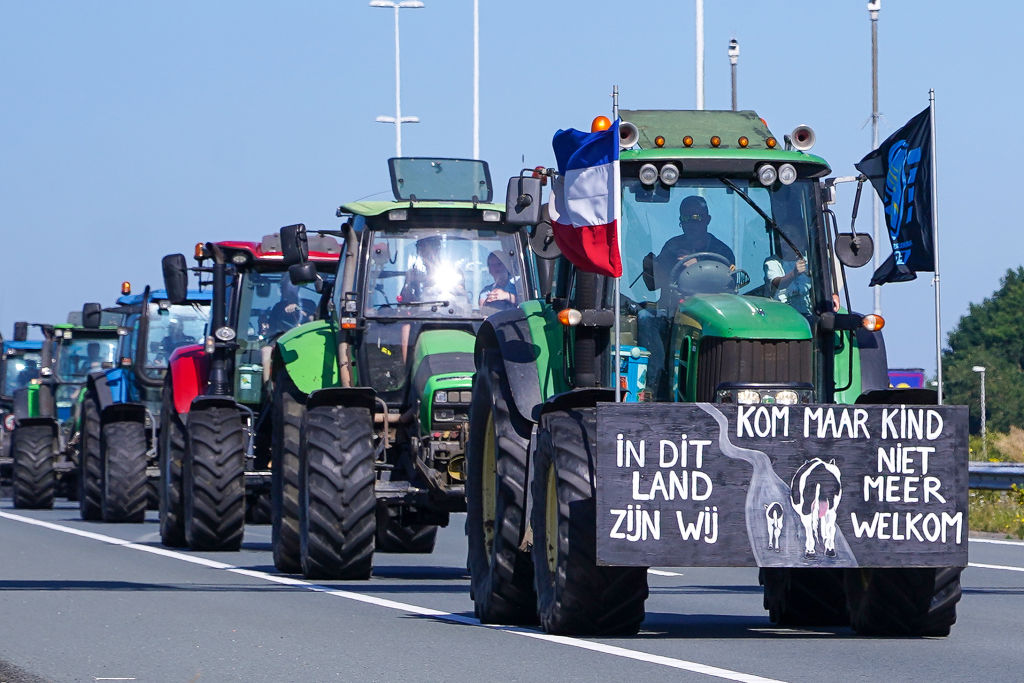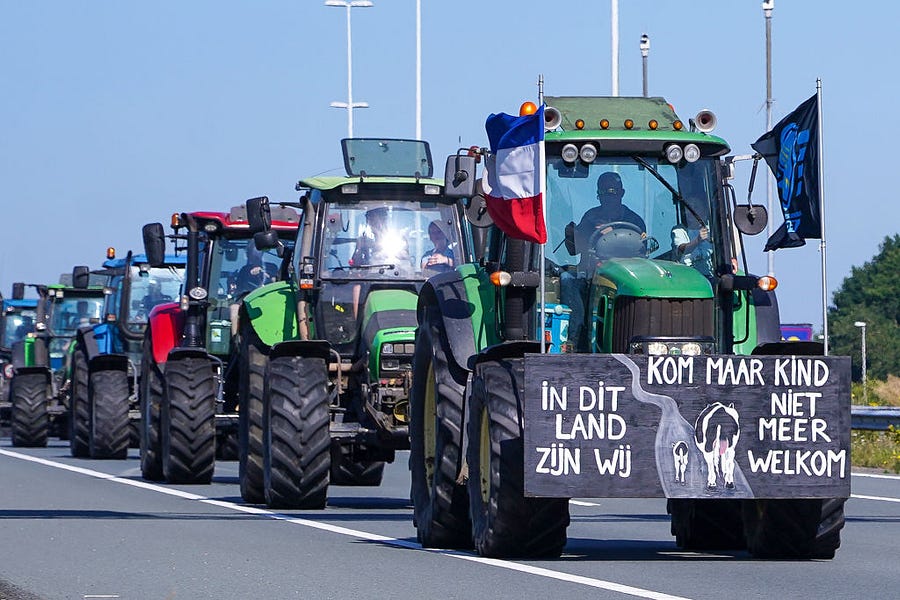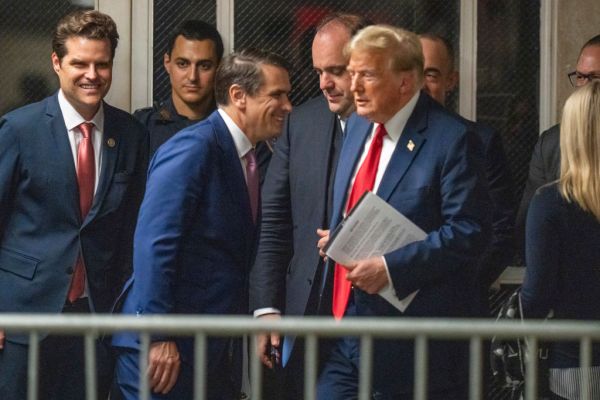Happy Tuesday! A California man sued Mars Inc. last week, alleging the candy company puts an ingredient in Skittles that render them “unfit for human consumption.”
The ingredient? Well, let’s just say “The Rainbow” might be made of titanium dioxide.
Quick Hits: Today’s Top Stories
-
U.S. Africa Command announced yesterday it conducted an airstrike in a remote location in Somalia on Monday that killed two al-Shabaab terrorists, one day after members of the group attacked partner forces near the city of Libikus. The military said no civilians were injured or killed in the attack, and the strikes represent the first major U.S. action in the east African country since President Joe Biden ordered the redeployment of hundreds of troops there in May.
-
During a visit to troops fighting in Ukraine, Russian Defense Minister Sergei Shoigu ordered his forces to focus on destroying the long-range rocket and artillery systems Western countries have sent Ukraine in recent months. U.S.-provided HIMARS have reportedly allowed Ukrainian forces to strike Russian logistics centers and supply lines well beyond the front lines.
-
More than 1,100 people have reportedly died in Spain and Portugal from heat-related causes in recent days, as an unbearable heat wave sweeps across Europe. The United Kingdom declared an unprecedented national emergency on Monday as the country experienced its hottest day on record. Tens of millions of Americans—mostly in Texas and Oklahoma—are under an excessive heat warning with temperatures expected to reach up to 112 degrees Fahrenheit today.
-
Foreign Affairs Committee Chair Tom Tugendhat was eliminated on Monday from the race to succeed British Prime Minister Boris Johnson, leaving just four Conservative candidates—former Chancellor of the Exchequer Rishi Sunak, Trade Minister Penny Mordaunt, Foreign Secretary Liz Truss, and Equalities Minister Kemi Badenoch—vying for the post. Tory lawmakers are likely to whittle the field down to two candidates on Thursday.
-
Former Vice President Mike Pence on Monday endorsed Karrin Taylor Robson—a former member of the Arizona Board of Regents—in the state’s upcoming Republican gubernatorial primary, labeling her the “only candidate” in the race who will promote conservative values. The move aligns him with outgoing Gov. Doug Ducey but pits him against former President Donald Trump, who is backing former local TV news anchor and Stop the Steal proponent Kari Lake in the August 2 primary. Both Pence and Trump plan to travel to Arizona on Friday to campaign for their respective candidates.
-
House Democrats have scheduled votes this week on legislation that would essentially create via federal statute rights established by the Obergefell v. Hodges and Griswold v. Connecticut* Supreme Court cases—marriage equality and access to contraception, respectively—after the court’s decision to overturn Roe v. Wade last month. Justice Clarence Thomas signaled in his Dobbs concurrence a desire to revisit those precedents, but Justices Samuel Alito and Brett Kavanaugh were adamant that “overruling Roe does not mean the overruling of those precedents, and does not threaten or cast doubt on those precedents.”
-
National Institute of Allergy and Infectious Diseases Director Dr. Anthony Fauci—who also serves as President Joe Biden’s chief medical adviser—told Politico on Monday he will retire from his post by the end of Biden’s current term, after more than 50 years in public health.
What’s up with the Dutch Farmers’ Protests?

Do we think Dutch cows have noticed that something’s up?
Their farmers have been gone more often than usual, for one thing, as about 40,000 of them protested in the Hague earlier this month, using their tractors to block traffic (and a supermarket distribution center) and spread manure in streets. The cows may have also perceived a distinct lack of hay bales in their barns and fields: Farmers have been dumping them on roads and lighting them on fire beside highways. Two cows were stationed outside Parliament during a protest—they enjoyed head scratches from protesters—while their farmer proclaimed that new environmental regulations would send one of them to an early death at a slaughterhouse.
Whether the cows are aware or not, Dutch farmers have been mounting fierce opposition to the Netherlands’ new plan to halve the country’s nitrogen emissions by 2030. The country has long struggled with pollution from its vibrant agricultural sector, and its courts have ruled recently that it must cut emissions by 25 percent from 1990 levels and reduce nitrogen buildups damaging natural areas designated sensitive by the European Union and protected by Dutch law. The plan aims to comply with those rulings by way of drastic cuts, including for the agricultural sector.
Provinces have a year to plan exactly how to carry out the reductions, but the burden will fall most heavily on areas near the nature preserves, including many farms. Since the agricultural sector currently accounts for about 40 percent of the Netherlands’ nitrogen compound emissions, the government estimates the plan will require a 30-percent reduction in livestock herds, along with reduced usage of nitrogen-based fertilizers—which have no perfect replacement—and other changes to farming methods that will likely reduce yields and eat into profits.
Large farms—and those far from the nature preserves and which thus have laxer emissions standards—will probably be able to comply with the new rules. But many smaller farms—and those closer to the nature preserves—will likely go under. “The minister sees 3 options for farmers: Making (further) sustainability, relocating or ending,” the government said in an announcement describing the plan. “The honest story is also that not all farmers can continue with their business.”
Officials have set aside about $25.6 billion to fund the changes and buy out farmers, but they’ve run into resistance: Many farmers have no interest in abandoning their farms, many of which have been owned by the same family for decades. “Once a farm goes away, it never comes back,” fifth-generation dairy farmer Erik Luiten—required to cut his emissions 12 percent—told Deutsche Welle.
With top products including flowers, eggs, dairy, and meat, the Netherlands is the world’s second-largest agricultural exporter, trailing only the United States—despite the European country being about half the size of South Carolina. It has the highest livestock density in the European Union, and that much productivity from that little land means intense concentrations of nitrogen-based fertilizer and clouds of ammonia (which contains nitrogen) from livestock waste. Those compounds build up, causing smog, acidified soil, algae blooms, and other ill effects.
The Dutch government has tried various nitrogen-reduction methods to comply with EU regulations, including reducing the maximum speed limit on highways and buying out swine farmers. Employing air scrubbers that remove ammonia from the air leaving livestock facilities, feeding farm animals low-protein diets, injecting liquid manure into the soil, and other updated farming practices have reduced ammonia emissions by about 60 percent since the 1980s, though the trend began reversing in 2014 as dairy farms expanded.
Farmer advocacy groups have endorsed these changes and other emissions reduction methods but say they need a longer transition period to comply. “The government is going to spend 25 billion euros on clearing the countryside, but has no analysis of the consequences if thousands of farms disappear,” LTO Netherlands—an advocacy group that says it represents 35,000 farmers—wrote in a statement. “It is incomprehensible that this far-reaching process is started without a social, cultural and economic test beforehand.” The government has appointed an intermediary to lead talks between farmers’ groups and officials writing the details of the new regulations.
The Netherlands isn’t alone in trying to make big changes. Nearby Belgium is buying out farmers as well and has drafted a plan to reduce the number of pigs in the country by 30 percent within the decade. New Zealand has a plan to tax farmers on methane emissions from their livestock. Sri Lanka’s government ordered an abrupt transition to fertilizer-free farming that devastated crop yields and helped spark months of protests that eventually forced the president to flee the country.
And the protests over new environmental regulations aren’t just confined to Sri Lanka and the Netherlands: German farmers launched their own traffic-blocking tractor convoys in 2019 and 2020 to protest new nitrogen compound runoff restrictions and other measures. Spanish farmers and hunters have protested environmental policies this year as well.
Dutch Prime Minister Mark Rutte has been sympathetic to farmers’ concerns but declined to offer any real alternatives. “Of course, [the emissions reduction plan] has enormous consequences,” Rutte said last month. “I understand that, and it is simply terrible. And especially if they are businesses handed down in the family who want to proudly continue.”
Worth Your Time
-
Earlier this month, Arizona Gov. Doug Ducey signed a bill into law that made it illegal to record law-enforcement officers from within eight feet of police activity. Alexa Gervasi and Anya Bidwell—lawyers at the Institute for Justice—believe the statute is unconstitutional. “State Rep. John Kavanagh, the legislation’s sponsor, claims it will prevent interference with police activity and protect civilians from danger. But it isn’t narrowly tailored to serve these objectives,” they argue in the Wall Street Journal. “It isn’t illegal to be within 8 feet of police activity, only to record. It was already a crime to interfere with law enforcement. Peacefully recording police in a public space without interfering with their activity can’t be subject to any restrictions. The law, which takes effect in September, will eliminate access to information, make government less accountable, sweep police wrongdoing under the rug, and penalize civic engagement.”
-
Can pickleball save America? More than 1 million people picked up the sport—played with paddles and a Wiffle-like ball—during the pandemic, bringing the total number of pickleheads in the United States to 5 million. “Robert D. Putnam’s book ‘Bowling Alone,’ from 2000, mourns the loss of beloved community groups—a bridge club in Pennsylvania, an N.A.A.C.P. chapter in Roanoke, a sewing charity league in Dallas—which, for decades, fostered norms of reciprocity, trustworthiness, and general good will,” Sarah Larson writes in The New Yorker. “A craving for such feelings is a key part of pickleball’s popularity. At one tournament, a senior pro told me, ‘The most important thing about this sport is the friendships. I just lost my husband a week ago, and the only reason I’m here today is because of my pickleball community lifting me up.’ She got teary. ‘There’s no other sport like that. Tennis isn’t like that. You go to a tennis tournament, it’s them against you.’”
-
Ten years is a long time in any industry, but it’s an eternity in podcasting. Ben Lindbergh, Meg Rowley, Sam Miller, and Jeff Sullivan celebrated a decade of talking baseball on yesterday’s episode of Effectively Wild, and that’s as good of a hook as Declan will ever have to promote his favorite (non-Dispatch) podcast in this newsletter. The show has existed in many different iterations over the years, but the quality and charm have remained constant. If you’re a hardcore baseball fan—or even if you’re not—give one of the 1,877 episodes Ben & Co. have recorded a listen. They discuss the day-to-day happenings of the season, yes, but also dive into the history of the game, explore statistical anomalies, entertain absurd hypothetical questions, and answer listener emails. When did the term change from “striker” to “batter,” and why? How many times has a pitcher faced off against a player for whom he was traded? Why did three-time MVP Mike Trout agree to be the spokesman for SuperPretzel? Would having a third arm help or hurt a player in the field?
That’s a Lot of Dingers
Presented Without Comment
Also Presented Without Comment
Toeing the Company Line
-
On today’s episode of Advisory Opinions, Sarah and David are joined by Yale University law professor Akhil Amar for a discussion of liberal constitutional originalism. Who gets to decide what the common good is? Are philosophers really as smart as they think they are?
-
It’s Tuesday, which means it’s time for Dispatch Live again. Members should watch for an email later today with more details.
-
On the site today, Audrey reports on Joe O’Dea, the Colorado Republican who survived Democrats’ attempts to boost his primary opponent in last month’s primary and now poses a challenge to Democratic Sen. Michael Bennett in November. Intern Augustus Bayard explains everything you wanted to know about lithium-ion batteries and how close they are to powering a green-energy future in the U.S. Plus, Michael J. Petrilli makes the case for front-loading support to young children in Sen. Mitt Romney’s proposed pro-family legislation, and Danielle Pletka explores the achievements—or lack thereof—of Biden’s recent trip to the Middle East.
Let Us Know
What hypothetical government regulation related to your industry or line of work would have you burning bales of hay on the side of the road in protest?
Correction, July 19, 2022: The House is seeking to codify protections established in Griswold v. Connecticut, not Lawrence v. Texas.






